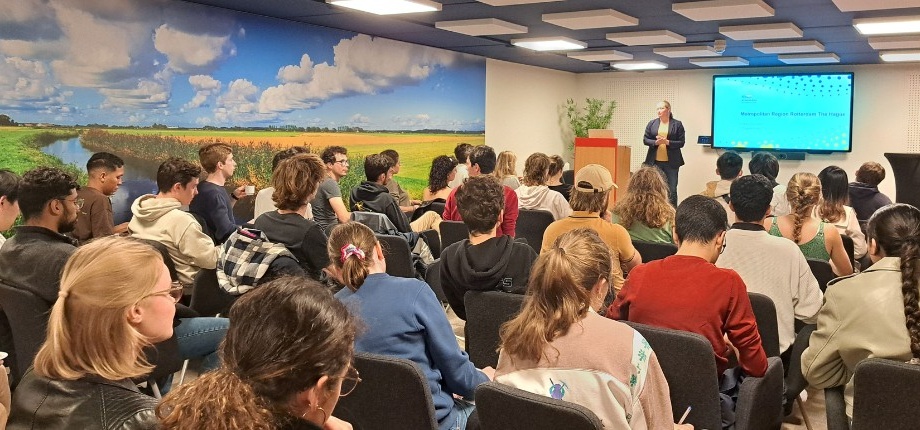City, Environment, Transportation
The department welcomes students who wish to practice, as engineers, occupations related to the development of territories and cities, development and management of networks, in the field of transport and environment.
To know the academic prerequisites required to follow the courses in this department, please refer to the prerequisites tab or to the downloadable document.
The engineering programme at École nationale des ponts et chaussées prepares each student to become a real player in sustainable development and planning in all its dimensions. Engineers graduating from École nationale des ponts et chaussées are recognized by companies for their strong scientific skills combined with a capacity for practical implementation of knowledge and projects.
Engineering education at École nationale des ponts et chaussées leads to the development of skills in four dimensions:
Advanced scientific and technical education: understanding and implementing conceptual, mathematical or numerical modelling approaches while knowing how to critically evaluate the results of a model is one of the foundations of the engineering profession that the School's training enables students to master.
Project-based and on-the-job training: from the very first year, numerous collective or individual projects are developed, increasingly close to real engineering projects. For students entering the first year, four internships in laboratories and companies will punctuate the curriculum.
Managerial, human and social skills: integrated from the first year, the human and social sciences give students an understanding of the world and the ability to take into account the problems of society. A solid knowledge of the business world is developed through courses, internships and projects.
The ability to work in a team and to work internationally: 20% of teaching time is devoted to languages. International stays and contact with many foreign students enable engineering students to learn to work in a multicultural context.
In the context of admissions of international students from partner institutions, it should be specified that:
The engineering degree from Ecole nationale des ponts et chaussées is a general engineering degree with prerequisites common to all teaching departments in the School's core disciplines: Mathematics (Optimization, Probability, Analysis and Scientific Computing), Continuous and Solid Mechanics, Quantum Physics and Statistics, Programming, Human and Social Sciences.
The vast majority of courses in engineering training are in French. A B1 level in French is therefore required to be proven by a certificate (TEF, TCF, DELF, DALF).
A TOEIC score of at least 785 points (or an equivalent international test, such as TOEFL, IELTS or Cambridge Proficiency, CAE or FCE) is required in order to obtain an engineering degree from Ecole nationale des ponts et chaussées at the end of the course. For this reason, a B1 level in English is required for admission, to be proven by a certificate (IELTS, TOEFL, TOEIC, CAMBRIDGE).
In addition, each department of engineering education has specific prerequisites:
City, Environment, Transportation Department
The courses given in the City-Environment-Transportation (VET) department are organized into three majors (“parcours”): Urban Planning, Water/Environment, and Transportation. Students must position themselves on one of these majors, which will be their area of specialization when they will leave the Ecole nationale des ponts et chaussées; they also follow courses in the VET core curriculum, which give them a more general vision of the major issues of the sustainable city. Thus, following the example of the Ecole des Ponts engineering programme, the VET department has prerequisites for all students admitted, as well as others that are specific to each course.
Prerequisites common to all three majors
Space and territorial issues
Transport, mobility,
Different scales of development,
Urban infrastructures and networks (water, sanitation, roads, energy...),
Basics of techniques to describe and characterize spatial variability.
Global environmental and sustainable development issues
Key current energy and environmental transition issues and challenges facing the world today
Ability to take a cross-cutting and systemic view of these issues (description and modeling of interrelationships and feedback loops)
Economy
Fundamental tools of macroeconomic analysis and current key issues in contemporary macroeconomics (causes and consequences of inflation and unemployment, impact of cyclical stabilization policies, structural wealth gaps between countries, growth, development and energy transition, determinants and effects of globalization)
Conditions for optimal allocation of scarce resources
Conditions for the microeconomic efficiency of the market as a means of coordinating agents, but also the causes of its malfunctioning that justify public intervention by the regulator
Tools for analyzing market functioning and evaluating public policies
Return on investment.
Probabilities and statistics
Fundamental notions (probability space, random variable, law, expectation ...)
Usual laws with real and integer values
Concepts of convergence, strong law of large numbers, and central limit theorem
Main algorithms for simulating random variables
Monte-Carlo method
Basics of descriptive statistics
Estimation, confidence intervals, hypothesis testing
Simple and multiple linear regression
Water/Environment major
Fluid mechanics
Fluid Statics
Eulerian Kinematics
Euler equations, Navier-Stokes equations
Reynolds number, irrotational flat flows of incompressible perfect fluid
Actual and complex potential
Transport major
Basics in Operations Research
Urban Planning major
Level B2 in French recommended
| Semester | Year Master cycle | Course title | ECTS | Status | Track | Instruction language |
| Fall | 1 | Autonomous vehicle and electric mobility | 1,5 | Compulsory | French | |
| Fall | 1 | Business Management | 2 | Compulsory | French | |
| Fall | 1 | Challenges related to Urban Planning and Environment | 1,5 | Compulsory | French | |
| Fall | 1 | Global environmental issues and sustainable development | 1,5 | Compulsory | French | |
| Fall | 1 | Statistics | 2 | Compulsory | French | |
| Fall | 1 | Analysis and design of transportation systems | 3,5 | Semi-elective | Transport | French |
| Fall | 1 | Crisis management | 1,5 | Semi-elective | Environment | French |
| Fall | 1 | Energy: stakes, reduction and modification of consumption | 2 | Semi-elective | French | |
| Fall | 1 | Environment and energy economics | 3 | Semi-elective | Environment | French |
| Fall | 1 | Fluid Mechanics | 3 | Semi-elective | Environment | French |
| Fall | 1 | Hydrology: modeling and decision support | 3,5 | Semi-elective | Environment | French |
| Fall | 1 | Methods of analysis of territorial systems | 4,5 | Semi-elective | French | |
| Fall | 1 | Operational research and optimization | 3 | Semi-elective | Transport | French |
| Fall | 1 | Stations and exchange hubs | 1,5 | Semi-elective | Transport | French |
| Fall | 1 | Traffic engineering | 3,5 | Semi-elective | Transport | French |
| Fall | 1 | Urban planning economics | 2 | Semi-elective | Urban planning | French |
| Fall | 1 | Urban planning law | 4 | Semi-elective | Urban planning | French |
| Spring | 1 | Accessibility Day | 0 | Compulsory | French | |
| Spring | 1 | Coaching and Career Guidance | 0,5 | Compulsory | French | |
| Spring | 1 | Introduction to law | 3 | Compulsory | French | |
| Spring | 1 | Seminar - Department Project | 6 | Compulsory | French | |
| Spring | 1 | Territorial policies and local finances | 3 | Compulsory | French | |
| Spring | 1 | Atmospheric environment and air quality | 3,5 | Semi-elective | Environment | French |
| Spring | 1 | Discrete choice econometrics | 3 | Semi-elective | Transport | French |
| Spring | 1 | Environment, water and meteorology | 6 | Semi-elective | Environment | French |
| Spring | 1 | Environmental and industrial risks | 2,5 | Semi-elective | Environment | French |
| Spring | 1 | Freight and transport of goods | 6 | Semi-elective | Urban planning | French |
| Spring | 1 | Places and modes of freight transportation | 6 | Semi-elective | Transport | French |
| Spring | 1 | Transport economics | 2 | Semi-elective | Transport | French |
| Spring | 1 | Transportation and Land Use in Urban and Regional Settings | 6 | Semi-elective | Urban planning | French |
| Spring | 1 | Transportation and urban and regional planning | 6 | Semi-elective | Transport | French |
| Spring | 1 | Urban planning | 3,5 | Semi-elective | Urban planning | French |
| 1 | Humanities and Social Sciences | 3 | Compulsory | French | ||
| 1 | Internship | 2,5 | Compulsory | |||
| 1 | Languages | 7,5 | Compulsory | |||
| 1 | Sport | 1 | Compulsory | French | ||
| Fall | 2 | Carbon Footprint and Life Cycle Assessment | 1,5 | Compulsory | French | |
| Fall | 2 | Internship feedback | 1,5 | Compulsory | French | |
| Fall | 2 | Languages | 4,5 | Compulsory | ||
| Fall | 2 | Free choice of courses | 21 | Elective | ||
| Spring | 2 | Graduation project | 30 | Compulsory |
- Analysis and design of transportation systems
- Atmospheric environment & air quality
- City and regional planning
- City environment - Transport seminar
- Design and operation of supply chain and transport systems
- Energy : issues & demand-side management
- Environmental Global Issues and Sustainable Development
- Freight Transport System
- Hydrology : modeling and decision
- Integrated water resources management
- Introduction to Data Assimilation
- Introduction to transportation safety and security
- Life Cycle Assessment of urban transportation modes
- Local public finance and policies
- Methods for territorial analysis
- Microeconomic Modelling for the Urban Planning
- Prevention and waste management
- Railway and guided transport operation
- Tools for Analyzing Mobility Behaviors
- Traffic engineering – 1 & 2
- Urban and Regional Planning
- Urban hydrology
- Urban planning & design
- Urban transport management
- Water and Environment Workshop
- Water politics and policies
- Water treatment technologies
Access to the entire range of courses is not guaranteed: some courses are limited in number or have specific pre-requisites.
To consult the accessibility of the courses in the catalog > go to the "department" tab.
Up to 30% of programme courses can be chosen among other departments (Civil and structural engineering; Mechanical Engineering and Materials Science; Industrial engineering; Applied mathematics and computer science; Economics, management, finance; Languages and Cultures; Humanities and Social Sciences).
Future graduates find various career opportunities offering high positions in the public sector – Government departments, public organizations, regional and local authorities – and in the private sector, in large industrial corporations, consultancy bureaus, or design offices.
- Infrastructure or transit operators, waste management infrastructures, water infrastructures, logistics departments in industry;
- Engineering consultancy in the environment, transportation: roles in design, innovation, development, project management, technical evaluations;
- Planning and development: district planning, master plans, planning of infrastructure and service schemes;
- Government or local authority regulation: representing government, regulatory management, monitoring, and strategic decision-making;
- Environmental management: responsibility for setting and implementing environmental policy in the private and public sectors and regional and local authorities;
- Urban planning engineer;
- Researcher, research & development engineer.

